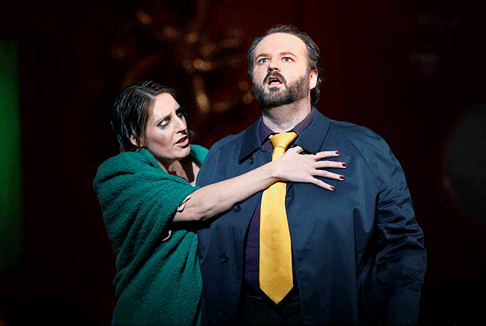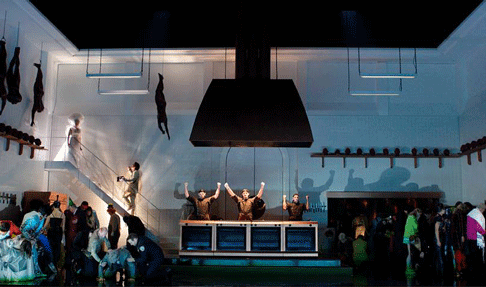![Kirsten Blanck as Princess Turandot [Photo by Catherine Ashmore courtesy of English National Opera]](http://www.operatoday.com/Turandot_011.gif)
13 Oct 2009
Turandot at ENO
A writer goes to dine in an urban Chinese restaurant, where his eye is caught by a distressed young woman among the crowd of diners.
English Touring Opera are delighted to announce a season of lyric monodramas to tour nationally from October to December. The season features music for solo singer and piano by Argento, Britten, Tippett and Shostakovich with a bold and inventive approach to making opera during social distancing.
This tenth of ten Live from London concerts was in fact a recorded live performance from California. It was no less enjoyable for that, and it was also uplifting to learn that this wasn’t in fact the ‘last’ LfL event that we will be able to enjoy, courtesy of VOCES8 and their fellow vocal ensembles (more below …).
Ever since Wigmore Hall announced their superb series of autumn concerts, all streamed live and available free of charge, I’d been looking forward to this song recital by Ian Bostridge and Imogen Cooper.
The Sixteen continues its exploration of Henry Purcell’s Welcome Songs for Charles II. As with Robert King’s pioneering Purcell series begun over thirty years ago for Hyperion, Harry Christophers is recording two Welcome Songs per disc.
Although Stile Antico’s programme article for their Live from London recital introduced their selection from the many treasures of the English Renaissance in the context of the theological debates and upheavals of the Tudor and Elizabethan years, their performance was more evocative of private chamber music than of public liturgy.
In February this year, Albanian soprano Ermonela Jaho made a highly lauded debut recital at Wigmore Hall - a concert which both celebrated Opera Rara’s 50th anniversary and honoured the career of the Italian soprano Rosina Storchio (1872-1945), the star of verismo who created the title roles in Leoncavallo’s La bohème and Zazà, Mascagni’s Lodoletta and Puccini’s Madama Butterfly.
Evidently, face masks don’t stifle appreciative “Bravo!”s. And, reducing audience numbers doesn’t lower the volume of such acclamations. For, the audience at Wigmore Hall gave soprano Elizabeth Llewellyn and pianist Simon Lepper a greatly deserved warm reception and hearty response following this lunchtime recital of late-Romantic song.
Collapsology. Or, perhaps we should use the French word ‘Collapsologie’ because this is a transdisciplinary idea pretty much advocated by a series of French theorists - and apparently, mostly French theorists. It in essence focuses on the imminent collapse of modern society and all its layers - a series of escalating crises on a global scale: environmental, economic, geopolitical, governmental; the list is extensive.
For this week’s Live from London vocal recital we moved from the home of VOCES8, St Anne and St Agnes in the City of London, to Kings Place, where The Sixteen - who have been associate artists at the venue for some time - presented a programme of music and words bound together by the theme of ‘reflection’.
'Such is your divine Disposation that both you excellently understand, and royally entertaine the Exercise of Musicke.’
Amongst an avalanche of new Mahler recordings appearing at the moment (Das Lied von der Erde seems to be the most favoured, with three) this 1991 Mahler Second from the 2nd Kassel MahlerFest is one of the more interesting releases.
‘And there was war in heaven: Michael and his angels fought against the dragon; and the dragon fought and his angels, And prevailed not; neither was their place found any more in heaven … that old serpent … Satan, which deceiveth the whole world: he was cast out into the earth, and his angels were cast out with him.’
If there is one myth, it seems believed by some people today, that probably needs shattering it is that post-war recordings or performances of Wagner operas were always of exceptional quality. This 1949 Hamburg Tristan und Isolde is one of those recordings - though quite who is to blame for its many problems takes quite some unearthing.
There was never any doubt that the fifth of the twelve Met Stars Live in Concert broadcasts was going to be a palpably intense and vivid event, as well as a musically stunning and theatrically enervating experience.
‘Love’ was the theme for this Live from London performance by Apollo5. Given the complexity and diversity of that human emotion, and Apollo5’s reputation for versatility and diverse repertoire, ranging from Renaissance choral music to jazz, from contemporary classical works to popular song, it was no surprise that their programme spanned 500 years and several musical styles.
The Academy of St Martin in the Fields have titled their autumn series of eight concerts - which are taking place at 5pm and 7.30pm on two Saturdays each month at their home venue in Trafalgar Square, and being filmed for streaming the following Thursday - ‘re:connect’.
The London Symphony Orchestra opened their Autumn 2020 season with a homage to Oliver Knussen, who died at the age of 66 in July 2018. The programme traced a national musical lineage through the twentieth century, from Britten to Knussen, on to Mark-Anthony Turnage, and entwining the LSO and Rattle too.
With the Live from London digital vocal festival entering the second half of the series, the festival’s host, VOCES8, returned to their home at St Annes and St Agnes in the City of London to present a sequence of ‘Choral Dances’ - vocal music inspired by dance, embracing diverse genres from the Renaissance madrigal to swing jazz.
Just a few unison string wriggles from the opening of Mozart’s overture to Le nozze di Figaro are enough to make any opera-lover perch on the edge of their seat, in excited anticipation of the drama in music to come, so there could be no other curtain-raiser for this Gala Concert at the Royal Opera House, the latest instalment from ‘their House’ to ‘our houses’.
"Before the ending of the day, creator of all things, we pray that, with your accustomed mercy, you may watch over us."
![Kirsten Blanck as Princess Turandot [Photo by Catherine Ashmore courtesy of English National Opera]](http://www.operatoday.com/Turandot_011.gif)
A writer goes to dine in an urban Chinese restaurant, where his eye is caught by a distressed young woman among the crowd of diners.
He builds a bloody, Tarantino-esque fantasy plot around her and her surroundings, stepping in and manipulating the world he has created until the characters in his nightmarish scenario eventually become so real that they destroy not just the girl but the writer too.
The girl is Liù, the story Turandot, and the writer very likely Puccini himself (though no great effort is made to give actor Scott Handy the composer’s likeness). Puccini loved Liù as a character, and died after creating her death scene. Rupert Goold’s production ends with the dying writer (here, slashed through the stomach by Turandot’s sword just as Calaf overpowers her with a kiss) taking centre stage, while the triùmphantly united Calaf and Turandot are relegated to either side.
It wasn’t until an hour after the final curtain, when I sat down to draft this review after reading the programme notes in detail on my bus ride home, that the directorial conceit began to form a joined-up entity in my mind and I finally worked out — I think — what was supposed to be going on. While I was sitting in the Coliseum with it happening in front of me, it made no sense whatsoever, and that’s poor theatre by anybody’s standards. Turandot should be a garish nightmare, and this was — unfortunately, not always in the way the director intended. From the chorus, which looked as if it had been plucked from a generic modern-dress performance of Act 2 of La bohème (nuns, transsexuals, Elvis impersonators, dominatrices…), to the murderous dancers with chefs’ trousers and pigs’ heads, to the Emperor Altoum (eloquently sung by Stuart Kale) who was played as an eccentric old drunk that the ‘writer’ decides to use as a pawn in his story, to Turandot’s creepy little servant-girl (or familiar spirit?) in her First Communion outfit — none of it bore any relation either to the plot or to Puccini’s music.
Kirsten Blanck’s soft-grained voice and dry European consonants take away any real cutting edge from her soprano, but she has a voice that is more than adequate for such a big role in such a big theatre, and rides the Act 2 ensemble very effectively. It’s just a shame that her character is given no dramatic context whatever. In the first act, Calaf falls in love not with the real Turandot but with a giant ice-sculpture facsimile of her; from her first appearance ‘in the flesh’ in Act 2, she looks like a demented bride.
The vocal highlights of this production come from Gwyn Hughes Jones as Calaf and Amanda Echalaz as Liù. Hughes Jones sings gloriously, even if he sounds underpowered once the heavy orchestration of the Alfano ending is underway. Not a natural stage creature, he fails to create much of a character — like Blanck, he has next to no help from the director in doing so. Just why, exactly, does he fall instantly in love? And what is it about him that eventually melts the ice princess? He has vocal ardour in spades, but his physical presence is oddly dispassionate. As for Echalaz — after a few years of spectacular performances for smaller UK companies like ETO and Opera Holland Park, the South African soprano’s star is at last truly in the ascendant. It is a large voice and there is some work she could still do on some of the more delicate parts of the role, but she has a magnetic stage presence and (despite a truly horrible costume) gave a performance of real heart. The American bass James Cresswell was a sincerely sung, sympathetic Timur.
 Amanda Echalaz as Liù and Gwyn Hughes Jones as Calaf
Amanda Echalaz as Liù and Gwyn Hughes Jones as Calaf
In the pit, Ed Gardner is on top form, making the lyrical passages bloom and the brutal ones blaze, while the ENO Chorus produce a massive and impressive sound. Most of William Radice’s translation is pretty respectable, but there are a few obvious problems which really need to be ironed out: in one of the opera’s subtlest and most legato passages, the moon chorus in Act 1, the words are perversely set against the beat, while in Act 3 the principals are subjected to rather a lot of unkind ‘i’ and ‘ee’ vowels on climactic high notes. And Pang’s nostalgia for his ‘gardens near Kiù’ was always destined to raise an unintentional titter from a London audience.
 Full Stage
Full Stage
The trio of ministers was plagued by illness; Peter van Hulle replaced Christopher Turner as Pong, while Richard Roberts (announced as suffering from a throat infection but willing to sing anyway) croaked his way through the first act before yielding to understudy Gareth Huw John (singing from the side of the stage) for the rest of the opera. Fortunately Benedict Nelson, the Ping, was not only completely healthy but in particularly fine voice.
Turandot was really the last of the great repertoire standards to get an up-to-date production in London. It is not the nightmare-Chinese-restaurant setting (with sets imaginatively conceived by Miriam Buether) that ruins Goold’s vision of the opera but his willingness to allow many of the opera’s big climaxes to take second place to the point he wants to make about the composer’s relationship with the piece. As such, it is a frustrating experience.
Ruth Elleson © 2009